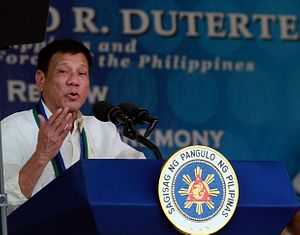On January 22, 2013, the Philippines submitted its disputes with China over the Spratly Islands to arbitration under Annex VII of the United Nations Convention on the Law of the Sea (UNCLOS). Prior to this action, on August 25, 2006, China lodged a declaration with the Secretary-General of the United Nations stating that it would exclude the disputes stipulated in Subparagraphs (a), (b) and (c), Paragraph 1, Article 298 of UNCLOS from compulsory conflict resolution procedures.
The Philippines argued that China is claiming sovereign rights and jurisdiction over all waters within the nine-dash line to bypass the jurisdiction restrictions, even though it is only allowed to claim rights and jurisdiction over waters measured from land, including islands. Based on this argument, the Philippines asked the arbitration tribunal to declare that water area establishment based on the nine-dash line violates UNCLOS, insisting that the reefs and submerged rocks in the Spratly Islands under China’s effective control have no territorial water, exclusive economic zone (EEZ), or continental shelf, and that the shores of the islands, such as the Scarborough Shoal, are “rocks that cannot sustain human habitation or economic life of their own” as provided in Paragraph 3, Article 121 of UNCLOS.
On July 12, 2016, the arbitration tribunal handed down a decision that favored the Philippines’ claims, ruling that there was no legal basis for China to claim historic rights to resources within the sea areas falling within the “nine-dash line.” However, China had refused to appear at the tribunal for the arbitration and had already declared it would ignore the arbitration award when it was granted. An arbitration award is binding, but UNCLOS has no mechanism for enforcing it. For that reason, China is likely to remain in effective control of the reefs in the South China Sea.
In the meantime, in a statement issued by its Ministry of Foreign Affairs on June 8, China urged Rodrigo Duterte, the new president of the Philippines, to resolve the disputes through negotiations. For his part, Duterte has refused to rule out the idea of bilateral negotiations with China. The question is whether or not these negotiations will be conducted on the basis of the arbitration award. China is claiming that the arbitration award is invalid, and as such would be expected to approach negotiations in disregard of the arbitration award. Yet the principles and guidelines for international negotiations, being resolution number 101 adopted at the 53rd Session of the United Nations General Assembly on December 8, 1998, state, “The purpose and object of all negotiations must be fully compatible with the principles and norms of international law, including the provisions of the Charter.” China cannot negotiate with disregard for the international law represented by the arbitration award.
As the plaintiff in this arbitration case, the Philippines bears the greater obligation to carry out the arbitration award. It is worth recalling here the G7 Foreign Ministers’ Statement on Maritime Security released on April 11, 2016, which said, “We call on all states to pursue the peaceful management and settlement of maritime disputes in good faith and in accordance with international law, including through applicable internationally recognized legal dispute settlement mechanisms, including arbitration, recognizing that the use of such mechanisms is consistent with the maintenance and enhancement of the international order based upon the rule of law, and to fully implement any decisions rendered by the relevant courts and tribunals which are binding on them, including as provided under UNCLOS” and “We call for the full and effective implementation of the Declaration on the Conduct of Parties in the South China Sea (DOC) in its entirety and the early establishment of an effective Code of Conduct in the South China Sea (COC).”
If Duterte negotiates with China from a position at odds with the arbitration award, the Philippines will lose the trust of its allies, including the United States and Japan, to the detriment of regional security. The disputes in the South China Sea are more than bilateral conflicts. They are an issue that now involves the entire region. The new president runs the risk of not only helping China in its bid to divide the Association of Southeast Asian Nations but also threatening the stability and development of Asia. The agreement between Japan and the Philippines on the transfer of defense equipment and technology that was signed on February 29, 2016 is aimed at preventing China from changing the status quo by force. The approval of China’s nine-dash line claim, which would turn other countries’ EEZs into its own waters, simply reflects the commitment of the international community to the reign of force. Like other allies, the Philippines must stand at the forefront of efforts to convert the South China Sea into an area to which UNCLOS is applied, so as to establish the rule of law in the South China Sea.
Shigeki Sakamoto is a professor at Doshisha University.

































